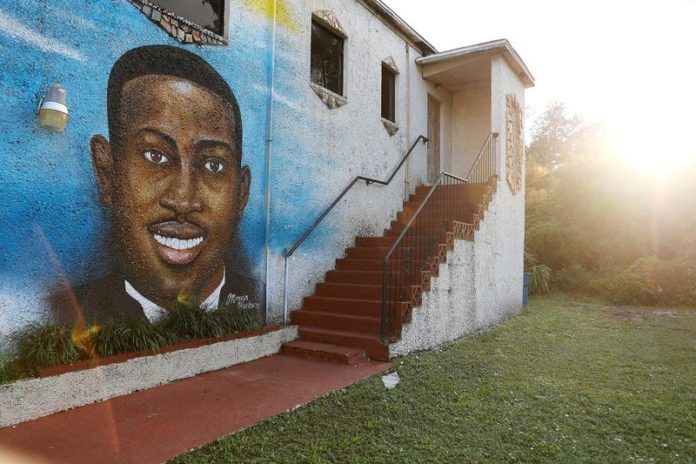(Reuters) – One potential juror sometimes enjoyed a Southern-style oyster roast and game of cards with the victim’s father. Another said her stepfather goes fly-fishing with two of the defendants. Others said they had seen the victim jogging around town or lifting weights in a neighbor’s driveway.
As jury selection drags into its second week in the trial of three white men charged with murdering Ahmaud Arbery, a Black man who went for a run in a mostly white neighborhood, one difficulty of prosecuting a major case in a small town is becoming clear: everyone seems to know everybody in Georgia’s Glynn County.
Judge Timothy Walmsley, prosecutors and the defense lawyers are trying to seat 12 jurors and four alternates who can weigh evidence without being swayed by bias in the trial at Glynn County Superior Court in Brunswick, a coastal city home to just 16,000 people.
Jury summonses went out to 1,000 people across Glynn County, population 85,000, about two-thirds white. Dozens of potential jurors have been questioned since the trial began on Oct. 18, identified only by numbers after the judge promised anonymity.
None of the 12 potential jurors questioned in court on the first day appeared to be acquainted with any of the parties, but the issue quickly became apparent soon after.
A woman who works in a hospital told the court her husband and father-in-law know William “Roddie” Bryan, one of the three defendants facing charges that include murder, aggravated assault and false imprisonment.
Bryan helped give chase to Arbery down a road in the suburb of Satilla Shores in February 2020 and used his cellphone to film the encounter in which Arbery was cornered and then shot to death.
Another potential juror said he knew Gregory McMichael, Bryan’s neighbor, who led the chase in a pick-up truck with his son, Travis McMichael, in what they say was an attempt to make a citizen’s arrest.
“He’s a friend of my father’s and he’s been over to our house multiple times,” the man told the court, one of at least 20 potential jurors by Reuters’ count who have said they met or know either Arbery or the defendants.
Some potential jurors with especially close ties to a party have been dismissed. One was a woman who said she was third cousins with Arbery and grew up in the same house as his father, Marcus Arbery.
Another was a young man who recently moved to Brunswick and became close friends with Arbery after they met at a bar on one of the beach-lined islands nearby a few months before the shooting.
Some of the others with weaker ties have not yet been dismissed as the court tries to build a pool of 64 pre-screened people it intends to whittle down to the seated jury.
‘EVERYONE KNOWS EVERYONE’
A retired mechanic said he had met Travis McMichael, who confronted Arbery with a shotgun before fatally shooting him, because they were both in the same hunting club. The man also said he had known Bryan for about 20 years through Bryan’s work repairing small engines.
He said he was not close friends with either but pleaded, unsuccessfully, to be excused, saying it was too difficult for him to be impartial.
The web of relationships that has emerged underscores how tricky jury selection can be in small communities, said Annie C. Deets, a law professor at Emory University in Atlanta, who has previously been involved in picking jurors in small Georgia towns and cities both as a prosecutor and a defense attorney.
“Everyone knows everyone,” she said in an interview.
Knowing someone does not necessarily disqualify them from a jury, but it can be a big strike against them, she said.
One middle-aged man said he was friendly with Arbery’s mother and that Arbery’s father, who runs a landscaping business, had mowed his lawn about six months ago. Both parents have often been present for jury selection, the mother sometimes in tears.
One woman did not indicate that she knew any of the parties in questioning on Wednesday, but told the court about her husband’s job servicing equipment in the local 911 call center. A prosecutor asked: Did he ever share conversations he had with 911 operators?
“Don’t take this wrong,” she replied, “but this is a small town and people talk.”
Reporting by Jonathan Allen and Rich McKay; Editing by Ross Colvin and Daniel Wallis
Credit: Source link































